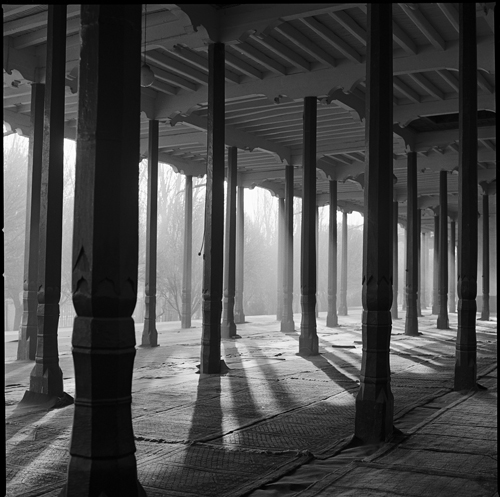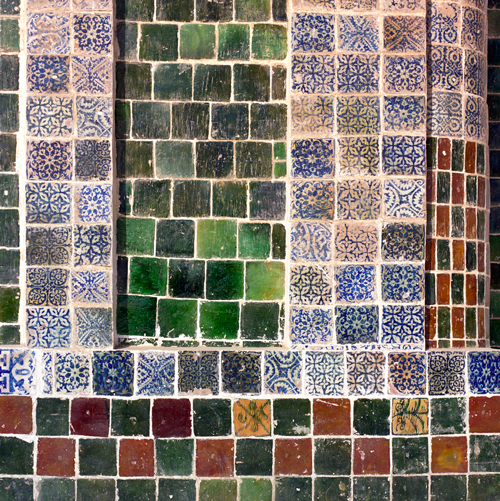
| |
Photos © Bubriski
|
Nominated for a Pulitzer Prize in Nonfiction "The Uyghurs: Kashgar before the Catastrophe should stop you in your tracks. With its haunting narrative, evocative photographs, and poignant texts and poems, this volume illuminates and inspires. Perhaps most important: At a time when Chinese authorities seek to erase Uyghur identity, this book also preserves." "The Uyghurs: Kashgar Before the Catastrophe, a powerful and important new book of photographs... captures a moment in time, when Kashgar was still intact as a cultural, historical and religious centre that was nevertheless moving into the modern world." "Bubriski's photographs capture the Uyghurs' cultural, economic, familial, religious, and spiritual traditions. The vibrancy, beauty, and grit of Kashgar and its people that Bubriski witnessed and photographed more 25 years ago has irrevocably changed, making his photographs even more significant." "Kevin Bubriski's photographs capture a Kashgar before the Chinese government's crackdown that is a window into humanity and tradition, a world that few of us got to know but many dream of. His photographs hold that dream like a fragile locket. With captivating texts and poetry by Tahir Hamut Izgil and a historical essay by Dru Gladney, this book can help one understand just how rich and filled with warmth, depth, and history this important and magical city once was. The Uyghurs is a testament to the resilience of Uyghurs whose voices, culture, and memory must carry on." "We often associate photographs with a feeling of loss, since they present the illusion of connecting to a person, place, or time that we know is already gone. This sense of loss is amplified in Kevin Bubriski's The Uyghurs: Kashgar before the Catastrophe, because the disappearances that were imposed on Uyghur communities since these images were made are so severe and so full of trauma. As Tahir Hamut Izgil attests in the story of his childhood in Kashgar, the persecution of Uyghurs was already taking place clandestinely while Bubriski's vivid images of Uyghur life were being recorded on the street. Two realities: one seen, one kept hidden. Bringing the two together in this book serves as a reminder that there is always more to imagine than what meets the eye in a photograph. The loss is real, but so is the life. "Kevin Bubriski's photographs offer a glimpse back into the ways and dreams of the people of Kashgar before the disasters of the twenty-first century. More than an echo of a vanished past, they suggest an alternative future: what it might look like for Uyghurs to live with dignity in the magnificent city they built themselves over the centuries." "Kevin Bubriski's images from Kashgar on the brink of the millennium are nothing short of fantastic. They achieve what every documentary photographer hopes to achieve: journalistic precision and visual poetry. They are less than a quarter of a century old but beautifully tell the story of a place like no other in Asia. On my repeated viewings, I was engulfed by a mix of emotions, from nostalgia of an ancient city I hold dear in my heart but could only visit too briefly to jealousy of not making such images during my first trip to the region, despair caused by looking at a rich heritage that has recently been destroyed to anger when thinking of the violence that many among these people had to go through in the last few years, many of them locked in Chinese reeducation camps. The Uyghurs is an important photographic testament to a place not so far away from us that is already long gone." "Bubriski has a special skill in structuring images interestingly from front to back; this adds to the viewers' discovery journey and viewing enjoyment. Excellent examples are the image of the children in the alley and the image of the assembled elders. "Bubriski's photos and Tahir's words are a poignant tribute to a time, a place and a people. Holding the book is an aesthetic pleasure. Bubriski's photographs are divided into four portfolios: Id-Kah Mosque, Afaq Khoja Mausoleum, and the People's Square; the streets and alleyways of the Old City; Kashgar's Bazaars; and its students and institutes of learning. The images are predominantly black and white, but each portfolio is book-ended by color images. The accompanying text is bilingual, translated from the Uyghur into English by the anonymous "M.A." and Xinjiang scholar Darren Byler. This not only highlights the original composition in Uyghur, but also underscores that the book is about knowledge belonging to Uyghurs."
|


